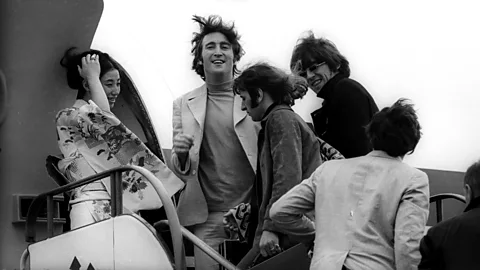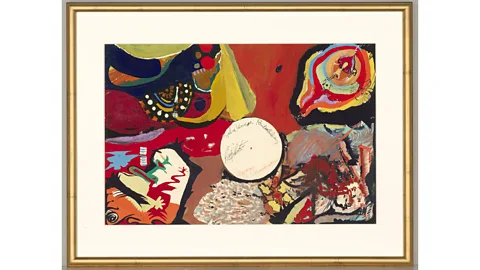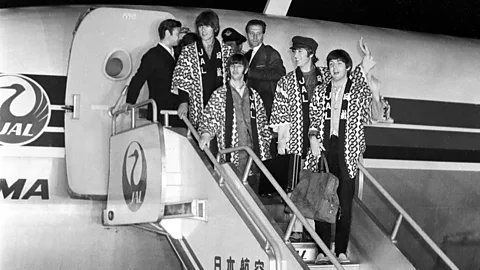By Deborah Nicholls-LeeFeatures correspondent

 Getty Images
Getty ImagesThe Beatles made a psychedelic painting together – now up for sale at a New York auction on 1 February – while holed up in a Japanese hotel room. Its creation seemed to provide a moment of calm at a tumultuous time.
It was meant to be their big introduction to the East, but when The Beatles disembarked at Tokyo's Haneda airport on 29 June 1966, dressed in matching Japanese happi coats, the security was oppressive. "I've never seen so many people guarding us," drummer Ringo Starr commented at the time. Death threats made by Japanese nationalists, who considered the Fab Four emblems of an invasive Western culture, saw the band confined for almost all of the five-day tour to the lavish Presidential Suite at Tokyo's Hilton Hotel, with little more than their musical instruments and their own company to entertain them.
Among a number of gifts delivered to their room were art materials of the highest quality, including wooden brushes, watercolours and oils. To pass the time, the band members laid a sheet of fine Japanese art paper on a table, placed a ceramic lamp at its centre to secure and illuminate it, and set about creating Images of a Woman, thought to be The Beatles' only painting.
More like this:
- The 1962 day that changed Britain
Almost six decades on, that painting is now for sale, with the famous four signatures scribbled in the circular space where the lamp once stood. The 54.6 x 78.8cm painting will go under the hammer at Christie's New York on 1 February and is estimated at $400,000 to $600,000. The lot is one of many items of extraordinary provenance featuring in "The Exceptional Sale", which includes a gold crocheted vest that belonged to Janis Joplin, and Elvis Presley's Gretsch guitar from his 1969 Las Vegas residency.

 Courtesy of Christie's
Courtesy of Christie's"Beatles mania continues in the market; we see that decade after decade," Casey Rogers, head of sale for The Exceptional Sale and senior vice-president for Christie's, tells BBC Culture. In 2009, the drum skin from the album cover of Sgt Pepper's Lonely Hearts Club Band sold at Christie's for more than $1m, four times the estimate. Rogers anticipates an equally lively auction on 1 February.
"It's by the hand of all four Beatles together, collectively," she says. "It's a piece of memorabilia and it's a piece of fine art, and I think that's what's really unique." The painting's sense of place is also significant. "It's a time capsule of a moment taken from 1966," Rogers adds. "It's something that I wish I had a soundtrack to."
Should there be any soundtrack, it's tempting to imagine it as their seventh album, Revolver, with the dreamy I'm Only Sleeping and the melancholy strings of Eleanor Rigby the background to their brushwork. It was in this suite that they decided on the album's name – nothing to do with guns, but a wordplay on a record's revolving motion. The critically acclaimed album was released just a month later and would go on to sell 27 million copies, with an extended, remixed and remastered version released in 2022. The painting's psychedelic swirls appear to reflect Revolver's transition towards the LSD-influenced soundscape that would characterise much of The Beatles' later work.
Turbulent tour
Outside the safety of their luxury suite, the atmosphere was a peculiar mixture of hysteria created by their young fans and ice-cold hostility from Japanese traditionalists. Their manager, Brian Epstein, had hired the only space large enough to accommodate their unprecedented following, but, for some, staging a pop concert in the hallowed Nippon Budokan Hall desecrated an important martial arts centre. Around 3,000 police officers were deployed each night to secure the venue. Japanese photographer Shimpei Asai, who was granted privileged access to The Beatles during their trip, said of the experience: "Things were so tense the whole time. I felt like I was a war correspondent."
The painting offered a welcome distraction. "They'd stop [painting], go and do a concert, then it was 'let's get back to the picture!'" remembers Robert Whitaker, quoted in Christie's press release. A photographer also managed by Epstein, Whitaker joined The Beatles on tour and created a series of images of them working on the piece. Christie's says that the aroma of the Virginia tobacco the band chain-smoked still lingers with the scent of the paint.

 Getty Images
Getty ImagesAll four Beatles had an interest in art. Lennon had attended art college and was a compulsive doodler, while McCartney was a keen photographer. Later, Ringo Starr and Paul McCartney would make painting an important part of their downtime, often raising money for charity from the sale of their work, and Harrison even made a canvas of the outside of his Surrey home, decorating it with colourful swirls.
Up on the 10th floor, in room 1005, each Beatle worked on their own quadrant and signed their name beside it, leaving us with a fascinating insight into the mind of each musician. In the bottom right, the artwork of George Harrison, who introduced the Indian sitar into Beatles recordings, is unsurprisingly the most experimental. Above it is McCartney's quadrant: the most precise and finely painted, speaking perhaps to the songwriter's perfectionism. The piece was untitled for decades until a journalist commented that McCartney's contribution resembled a woman's genitals.
Images of a Woman was made at a crucial time in Beatles history. Though a burgeoning Asian fanbase saw all five nights in Japan sell out, they were unable to shake the controversy created earlier that year by Lennon's comment that they were "more popular than Jesus". "The Beatles gave up touring two months after they were in Tokyo, and they never went back as a group," Beatles historian Mark Lewisohn told Christie's. "That's one of the reasons this painting is so special because they didn't have this kind of time together again."
When the time came to break free from the suite and head to the Philippines for the next stage of the tour, the finished piece was donated to the Beatles Fan Club in Japan, later passing into collectors' hands. It was a tumultuous period for the band, but creating a work of art had helped get them through it. According to Whitaker, "I never saw them calmer or more contented than at this time."
If you liked this story, sign up for The Essential List newsletter – a handpicked selection of features, videos and can't-miss news delivered to your inbox every Friday.
If you would like to comment on this story or anything else you have seen on BBC Culture, head over to our Facebook page or message us on Twitter.
"story" - Google News
January 30, 2024 at 06:00PM
https://ift.tt/5FZqfN3
The story behind the only known painting by The Beatles, as it goes up for sale at auction - BBC.com
"story" - Google News
https://ift.tt/hnlpFaN
https://ift.tt/BDVkrgI
Bagikan Berita Ini














0 Response to "The story behind the only known painting by The Beatles, as it goes up for sale at auction - BBC.com"
Post a Comment